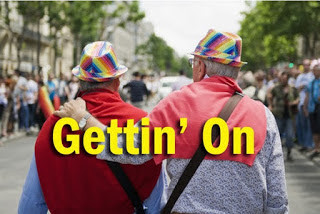From the Philadelphia Gay News
March 17, 2016
By Carol Sadtler
You’re flat on your back on your doctor’s exam table, feet in the stirrups. Or talking with a potential or longtime lover, wondering how — or if — to bring up the subject of sex. In these situations, wouldn’t it be wonderful to know what to say, do or expect?
As we grow older as lesbian, bisexual and trans women, information about sexual health and sexuality can be hard to come by. Since we’re in the crosshairs of our culture’s ageism, homophobia and inability to accept gender fluidity, there’s a dearth of information and other resources to meet our particular needs.
We often don’t know what we need to do to protect our health. Most doctors don’t know either, as guidelines for health-screening tests for lesbians and trans women are not established. In a recent conversation among several lesbians, for example, no one knew whether or not women not having sex with men need to have a pap smear after a certain age — because their doctors provided conflicting information. Due to discrimination and a lack of cultural competence on the part of providers, trans women can be denied needed screenings for prostate and breast cancer, according to the LGBT Elder Initiative’s Dawn Munro.
Judy Morrissey, director of behavioral health at Mazzoni Center (mazzonicenter.org), acknowledges that there are many myths and not enough solid information about sexuality and sex. “I suppose the most common generalization is that older lesbians are no longer sexual. There’s the old myth of ‘Lesbian Bed Death’ that brands older lesbian relationships as lacking sexual intimacy in favor of companionship. There are many myths and generalizations that abound about trans women, including the fetishizing of gender identity.”
When we are face-to-face with our physicians, many women find it difficult to talk plainly and openly about sex and sexuality — especially those born at a time or place where LGBT people were entirely invisible. Also, women who come out as lesbians in mid-life, or those who are transitioning, have to navigate a whole new world in the doctor’s office and elsewhere.
Dr. Lin-Fan Wang, a family physician at Philadelphia’s Mazzoni Center who specializes in trans health and sexual and reproductive health and well-being, says that health-care providers are obligated to find out the particular issues that their LGBT patients bring.
“Due to age and experience, some older patients are comfortable speaking openly with their clinicians and feel empowered to ask questions about their sexual health. However, some may be hesitant about bringing up sexual-health concerns due to shame or stigma.
“This may be particularly hard for patients who struggle with their identity, have body image issues or discomfort with their reproductive organs. Our job as clinicians is to provide an environment where our older patients feel more comfortable about bringing up and having discussions around sexual health,” Wang says.
Wang is optimistic about improved sexual health for lesbian, bisexual and trans women going forward.
“Increased healthy outcomes for these populations will happen if our society continues to become more supportive of lesbian, trans women, and gender-nonconforming people, and if sexuality, particularly sexuality of older people, becomes less stigmatized,” Wang said.
As Morrissey puts it: “I think an important strength is to know one’s own body and to understand that each person’s ‘healthy’ is unique to themselves. Many lesbians and women of trans experience have had to redefine ‘normal’ by forging new boundaries for the way we think about sex, sexuality, our bodies and our attractions and the fluidity of all these aspects of self.”
We also can empower ourselves — as health care is a human right. We can seek information, even demand it. We can keep talking about our sexuality and sex until we get comfortable talking. We can stay grounded in the fact that our sexuality is an essential piece of our identity for each one of us — even as we age.
From 12:30-3:30 p.m. April 9, the LGBT Elder Initiative will host “Women’s Sexuality as We Age” at the William Way Community Center, 1315 Spruce St. This event is free and open to those of any age who identify as women. A panel of experts will discuss the emotional, physical, spiritual and pleasure aspects of sex and sexuality and answer questions from attendees. To register or to receive more information, contact the LGBT Elder Initiative at 215-720-9415 or at info@lgbtei.org.
Carol Sadtler is a volunteer with the LGBT Elder Initiative and a marketing communications consultant, writer and editor. For more information on the LGBT Elder Initiative, visit www.lgbtei.org or call 215-720-9415.

